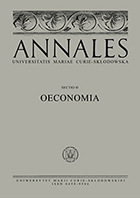Niestandardowe instrumenty polityki pieniężnej – doświadczenia Narodowego Banku Węgier
Unconventional Measures of Monetary Policy – Magyar Nemzeti Bank Experiences
Author(s): Ilona Skibińska-FabrowskaSubject(s): Supranational / Global Economy, Economic policy, Financial Markets
Published by: Wydawnictwo Naukowe Uniwersytetu Marii Curie-Sklodowskiej
Keywords: central bank; monetary policy; unconventional monetary measures; Central Bank of Hungary;
Summary/Abstract: The crisis that broke out in September 2008 has caused disturbances in the functioning of many economies. In response to the crisis, both governments and central banks have taken many steps. In the early stages they did not usually go beyond conventional tools. However, over time, the instruments started to become more and more unconventional. In the case of Hungary, the crisis has caused many unfavorable phenomena, both in the real and in monetary sphere. The National Bank of Hungary has developed non-standard monetary policy instruments that, on the one hand, improve the stability of the national financial system and, on the other, support the government’s program. This article will attempt to answer a question on the effectiveness of the central bank’s tools.
Journal: Annales Universitatis Mariae Curie-Skłodowska, Sectio H Oeconomia
- Issue Year: LI/2017
- Issue No: 6
- Page Range: 377-387
- Page Count: 11
- Language: Polish

